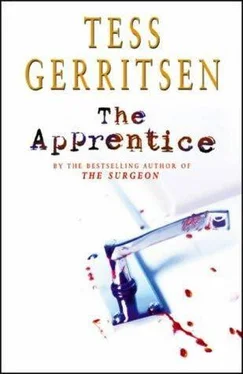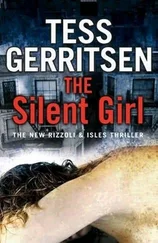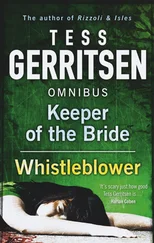She and Korsak slipped under the police tape and headed into the woods. This section of second-growth trees was as dense as any deep forest. They ducked beneath spiky branches that scratched their faces, and snagged their trouser legs on brambles. They emerged on the East Boundary jogging trail and spotted a strand of police tape, fluttering from a tree.
“The jogger was running along this path when his dog got away from him,” she said. “Looks like Sleeper left us a trail of tape.”
They crossed the jogging path and plunged once again into the woods.
“Oh man. I think I can smell it already,” said Korsak.
Even before they saw the body, they heard the ominous hum of flies. Dry twigs snapped beneath their shoes, the sound as startling as gunfire. Through the trees ahead, they saw Sleeper and Crowe, faces contorted in disgust as they waved away insects. Dr. Isles was crouched near the ground, a few diamonds of sunlight dappling her black hair. Drawing closer, they saw what Isles was doing.
Korsak uttered an appalled groan. “Ah, shit. That I didn’t need to see.”
“Vitreous potassium,” said Isles, and the words sounded almost seductive in her smoky voice. “It’ll give us another estimate for the postmortem interval.”
The time of death would be difficult to determine, Rizzoli thought, gazing down at the nude corpse. Isles had rolled it onto a sheet, and it lay faceup, eyes bulging from the heat-expanded tissues inside the cranium. A necklace of disk-shaped bruises ringed the throat. The long blond hair was a stiff mat of straw. The abdomen was bloated, and the belly was tinted a liverish green. Blood vessels had been stained by the bacterial breakdown of blood, and the veins were startlingly visible, like black rivers flowing beneath the skin. But all these horrors paled in view of the procedure Isles was now performing. The membranes around the human eye are the most sensitive surface of the body; a single eyelash or the tiniest grain of sand caught beneath an eyelid can cause immense discomfort. So it made both Rizzoli and Korsak wince to watch Isles pierce the corpse’s eye with a twenty-gauge needle. Slowly she sucked the vitreous fluid into a 10 cc syringe.
“Looks nice and clear,” said Isles, sounding pleased. She placed the syringe in an ice-filled cooler, then rose to her feet and surveyed the site with a regal gaze. “Liver temp is only two degrees cooler than ambient temp,” she said. “And there’s no insect or animal damage. She hasn’t been lying here very long.”
“It’s just a dump?” asked Sleeper.
“Lividity indicates she died while lying faceup. See how it’s darker on the back, where the blood’s pooled? But she was found lying here facedown.”
“She was moved here.”
“Less than twenty-four hours ago.”
“Looks like she’s been dead a lot longer than that,” said Crowe.
“Yes. She’s flaccid, and there’s significant bloating. Skin’s already slipping off.”
“Is that a nosebleed?” asked Korsak.
“Decomposed blood. She’s starting to purge. Fluids are being forced out by the internal buildup of gases.”
“Time of death?” asked Rizzoli.
Isles paused, her gaze fixed for a moment on the grotesquely swollen remains of a woman they all believed was Gail Yeager. Flies buzzed, filling the silence with their greedy hum. Except for the long blond hair, there was little about the corpse that resembled the woman in the photographs, a woman who once had surely turned men’s heads with just a smile. It was a disturbing reminder that both the beautiful and the homely are reduced by bacteria and insects to the grim equality of moldering flesh.
“I can’t answer that,” said Isles. “Not yet.”
“More than a day?” pressed Rizzoli.
“Yes.”
“The abduction was Sunday night. Could she have been dead since then?”
“Four days? It depends on the ambient temperature. The absence of insect damage makes me think the body was kept indoors until just recently. Protected from the environment. An air-conditioned room would slow down decomposition.”
Rizzoli and Korsak exchanged glances, both of them wondering the same thing. Why would the unsub wait so long to dispose of a decomposing body?
Detective Sleeper’s walkie-talkie crackled, and they heard Doud’s voice: “Detective Frost just arrived. And the CSU van’s here. You ready for ‘em?”
“Stand by,” said Sleeper. Already he looked exhausted, drained from the heat. He was the oldest detective in the unit, no more than five years from retirement, and he had no need to prove himself. He looked at Rizzoli. “We’re coming in on the tail end of this case. You been working with Newton P.D. on it?”
She nodded. “Since Monday.”
“So you gonna be lead?”
“Right,” said Rizzoli.
“Hey,” protested Crowe. “We were first on the scene.”
“Abduction was in Newton,” said Korsak.
“But the body’s now in Boston,” retorted Crowe.
“Jesus,” said Sleeper. “Why the hell are we fighting over this?”
“It’s mine,” said Rizzoli. “I’m lead.” She stared at Crowe, daring him to challenge her. Expecting their usual rivalry to flare up, as it always did. She saw one side of his mouth turn up in the beginning of an ugly sneer.
Then Sleeper said, into his walkie-talkie, “Detective Rizzoli is now lead investigator.” He looked at her again. “You ready for CSU to come in?”
She glanced up at the sky. It was already five P.M., and the sun had dipped below the trees. “Let’s get them in here while they can still see what they’re doing.”
An outdoor death scene, in fading daylight, was not a scenario she welcomed. In wooded areas, wild animals were always poised to descend, scattering remains and dragging off evidence. Rainstorms wash away blood and semen, and the winds scatter fibers. There were no doors, to lock out trespassers, and perimeters were easily breached by the curious. So she felt a sense of urgency as the crime scene unit began its grid search. They brought with them metal detectors and sharp eyes and evidence sacks waiting to be filled with grotesque treasures.
By the time Rizzoli tramped back out of the woods and onto the golf course, she was sweating and filthy and tired of swatting at mosquitoes. She paused to brush twigs from hair and pluck burrs from her slacks. Straightening, she suddenly focused on a sandy-haired man in a suit and tie, who stood beside the M.E.‘s van, a cell phone pressed to his ear.
She went to Patrolman Doud, who was still manning the perimeter. “Who’s the suit over there?” she asked.
Doud glanced in the man’s direction. “Him? Says he’s FBI.”
“What?”
“Flashed his badge and tried to talk his way past me. I told him he’d have to clear it with you first. Didn’t seem too happy about that.”
“What’s a fibbie doing here?”
“You got me.”
She stood watching the man for a moment, disturbed by the arrival of a federal agent. As lead investigator, she wanted no blurring of the lines of authority, and this man, with his military bearing and businessman’s suit, already looked as though he owned the scene. She walked toward him, but he did not acknowledge her presence until she was standing right beside him.
“Excuse me,” she said. “I understand you’re FBI?”
He snapped his cell phone shut and turned to face her.
She saw strong, clean-cut features and a coolly impervious gaze.
“I’m Detective Jane Rizzoli, the lead on this case,” she said. “May I see your I.D.?”
He reached into his jacket and pulled out the badge. As she studied it, she could feel him watching her, sizing her up. She resented his silent appraisal, resented the way he put her on guard, as though he was the one in control.
Читать дальше












